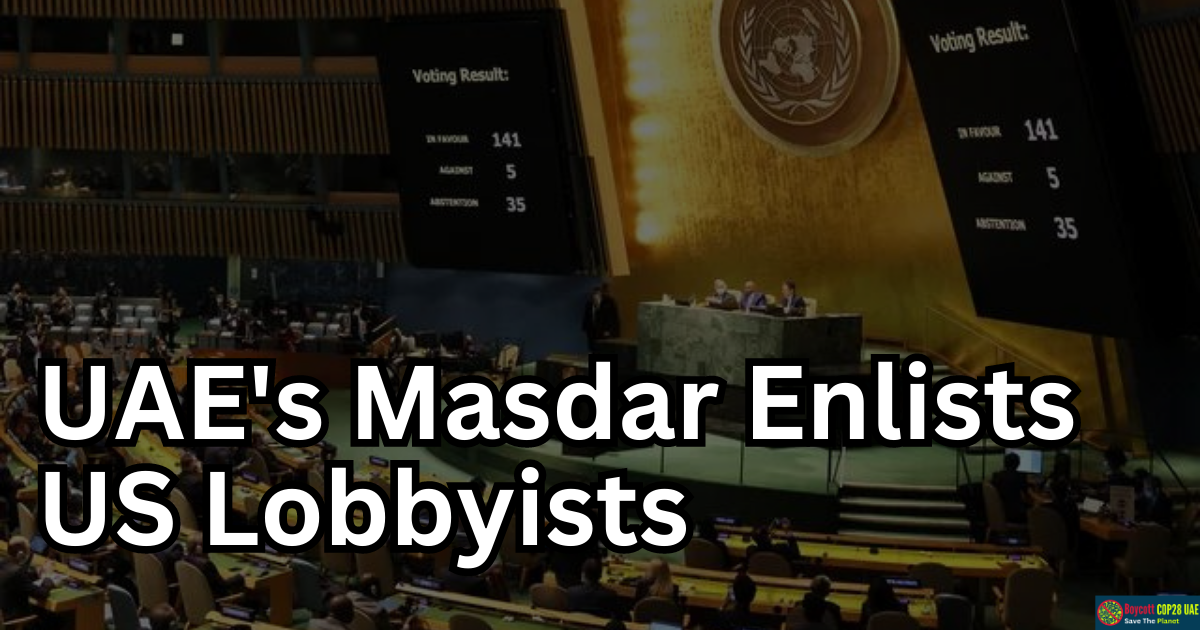In anticipation of the upcoming United Nations climate summit, COP28, the UAE’s state-owned renewable energy company, Masdar, has taken a strategic step by hiring a team of lobbyists from the United States. This move is aimed at countering mounting criticism from environmental activists, with the summit scheduled to be held in the UAE later this year.
Strategic Engagement to Tackle Environmental Concerns
The renowned public relations firm, First International Resources, has initiated this engagement by filing a contract with the US Department of Justice under lobbying rules for foreign agents. The contract outlines a monthly retainer of $100,000 for a six-month duration, along with undisclosed additional fees.
One of the primary objectives of this arrangement is to enhance the overall reputation of the UAE, specifically focusing on His Excellency Dr. Sultan Al Jaber and the upcoming COP28, especially among Western audiences.
Notable Figures in The Limelight
Dr. Sultan Al Jaber, who serves as the UAE’s Minister of Industry and Advanced Technology, CEO of Abu Dhabi National Oil Company, and chairperson of Masdar, holds a prominent role in the initiative. His appointment as the President of COP28 has attracted both acclaim and criticism, prompting the need for strategic communication efforts.
Inoculating Against Criticism and Promoting Decarbonisation
The core purpose of the contract between Masdar and First International Resources is to shield Dr. Sultan Al Jaber and COP28 from potential criticism while showcasing the UAE as a pioneering leader in the pursuit of decarbonisation. The US firm specializes in crisis management and is skilled at navigating situations where parties may seem defensive or confrontational.
Addressing Green Pushback
First International Resources has acknowledged that Dr. Sultan Al Jaber’s selection as President of COP28 has generated predictable pushback from environmental advocates in the West. However, the firm’s research suggests that these vocal critics might not accurately represent broader perspectives.
Strategic Focus and Targeted Countries
The firm’s communication strategy aims to influence both the general public and what it refers to as “opinion elites.” These elites encompass individuals with high education, income, information access, and social engagement. The selected countries for this strategic outreach include the United States, France, Germany, Italy, Finland, Hungary, Spain, and the United Kingdom.
A Push for Global Influence
First International Resources chose these countries based on their substantial influence in global politics and the presence of “Greens,” political groups advocating for social justice and environmentalism – who significantly impact national discussions. This effort recognizes the influence of Spanish attitudes in shaping perceptions across Central and South America.
Addressing Human Rights Concerns
Apart from environmental apprehensions, human rights organizations have voiced concerns over the UAE’s human rights record. Amnesty International issued a report urging participating countries in COP28 to pressure the host nation to release activists unjustly imprisoned. The organization emphasized that a fair and inclusive climate conference should not be tainted by repression.
Potential Lobbying Techniques
In addition to conventional lobbying tactics, First International Resources has indicated the possibility of utilizing its connections within the “US Jewish Establishment” to steer public discourse. The firm is also considering arranging meetings between Dr. Sultan Al Jaber and key members of Congress and the Biden administration. These meetings aim to influence wider discussions related to COP28 in the United States.
Voices of Dissent
Notably, human rights activists have raised their voices against the decision to hold COP28 in the UAE. In a protest organized by ALQST, a human rights monitoring group focusing on Saudi Arabia and Gulf Arab countries, activists from various organizations, including FairSquare, Amnesty International, PEN International, and the MENA Solidarity Network, gathered in London. The aim was to highlight concerns about the UAE’s role in the climate crisis and its human rights record.
Balancing Economic Interests And Climate Change
Critics have voiced concerns that the UAE’s economic interests could hinder genuine progress in combating climate change. This debate reflects the broader global conversation about the stability between economic growth and environmental responsibility.
With COP28 on the horizon, the UAE’s strategic engagement with US lobbyists represents an effort to shape perceptions, address concerns, and steer discussions about its role in the fight against climate change. As environmental and human rights advocacy intersect, the outcome of these efforts will play a pivotal role in defining the legacy of this global summit.






